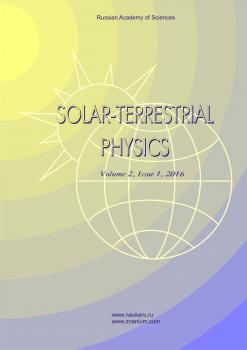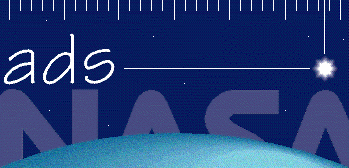Irkutsk, Russian Federation
Irkutsk, Russian Federation
The paper provides an overview of studies of infrasound signals from thunderstorms over a period of more than 30 years. We deal with several types of infrasound signals from thunderstorms detected at the ISTP SB RAS infrasound station Badary in Buryatia. Special attention is paid to signals arising during the rarefaction phase. A mechanism for generating signals of this type by converting the energy of the electrostatic field into fluctuations in the pressure field was proposed by Dessler in 1973. We propose a method for identifying thunderstorm infrasound signals of various types: 1 — signals from an expanding thermal lightning channel; 2 — signals with an electrostatic generation mechanism. Using infrasound signals recorded earlier at the station in Buryatia as an example, we discuss the validity of the thunderstorm cloud model and assess some parameters of the thunderstorm source of infrasound.
atmosphere, thunderstorm, infrasound, lightning channel, dangerous natural phenomena
1. Adushkin V.V., Rybnov Yu.S., Spivak A.A. Infrasound in the Atmosphere. M.: Torus Press, 2020, 319 p. (In Russian).
2. Arabagy V.I. On some characteristics of thunderstorm. Doklady AN SSSR [Reports of AS USSR]. 1952, vol. 82, no. 3, pp. 377-378. (In Russian).
3. Arabagy V.I. The spectrum of thunder. The nature, 1965, no. 7, pp. 74-75. (In Russian).
4. Assink J.D., Evers L.G., Holleman I., Paulssen H. Characteristics of infrasound from lightning. Geophys. Res. Lett. 2008, vol. 35, L15802. DOI:https://doi.org/10.1029/2008GL034193.
5. Balachandran N.K. Infrasonic signals from thunder. J. Geophys. Res. 1979, vol. 84, no. C4, pp. 1735-1745.
6. Blanc E. Observations in the upper atmosphere of infrasonic waves from natural or artificial sources: A summary. Ann. Geophys. 1985, vol. 3, pp. 673-688.
7. Bohannon J.L., Few A.A., Dessler A.J. Detection of infrasonic pulses from thunderclouds. Geophys. Res. Lett. 1977, vol. 4, no. 1, pp. 49-51.
8. Bowman H.S., Bedard A.J. Observations of infrasound and subsonic disturbances related to severe weather. Geophys. J. 1971, vol. 26, iss. 1-4, pp. 215-242. DOI:https://doi.org/10.1111/j.1365-246X.1971.tb03396.x.
9. Dessler A.J. Infrasonic thunder. J. Geophys. Res. 1973, vol. 78, no. 12, pp. 1889-1896.
10. Drob D.P., Picone J.M., Garces M. Global morphology of infrasound propagation. J. Geophys. Res. 2003, vol. 108, no. D21, p. 4680. DOI:https://doi.org/10.1029/2002JD003307.
11. Erushchenkov A.I., Filippov A. Kh., Makukhin V.L. Infrasound waves from lightning discharge. Issledovaniya po geomagnetizmu, aeronomii i fizike Solntsa [Res. on Geomagnetism, Aeronomy and Solar Physics] 1976, iss. 38, pp. 73-78. (In Russian).
12. Farges T., Blanc E., le Pichon A., Neubert T., Allin T.H. Identification of infrasound produced by sprites during the Sprite2003 campaign. Geophys. Res. Lett. 2005, vol. 32, L01813. DOI:https://doi.org/10.1029/2004GL021212.
13. Farges T., Blanc E. Characteristics of infrasound from lightning and sprites near thunderstorm areas. J. Geophys. Res. 2010. Vol. 115, A00E31. DOI:https://doi.org/10.1029/2009JA014700.
14. Few A.A. Acoustic radiations from lightning. Handbook of Atmospherics. CRC Press, Inc., Boca Raton, Fla., 1982, vol. 2, pp. 257-289.
15. Few A.A. The production of lightning-associated infrasonic acoustic sources in thunderclouds. J. Geophys. Res. 1985, vol. 90, no. D4, 6175-6180. DOI:https://doi.org/10.1029/JD090ID04P06175.
16. Few A.A. Acoustic radiations from lightning. Handbook of Atmospheric Electrodynamics. CRC Press, Boca Raton, Fla. 1995, vol. 2, pp. 1-31.
17. Filippov A.C. Thunderstorms of Eastern Siberia. Hidrometeoisdat, 1974. 75 p. (In Russian).
18. Holmes C.R., Brook M., Krehbiel P., McCrory R. On the power spectrum and mechanism of thunder. J. Geophys. Res. 1971, vol. 76, no. 9, pp. 2106-2115.
19. Liszka L. On the possible infrasound generation by sprites. J. Low Frequency Noise Vibration and Active Control. 2004, vol. 23, no. 2, pp. 85-93.
20. Liszka L., Hobara Y. Sprite-attributed infrasonic chirps - Their detection, occurrence and properties between 1994 and 2004. J. Atmos. Solar-Terr. Phys. 2006, vol. 68, pp. 1179-1188.
21. Pasko V.P. Theoretical modeling of sprites and jets. Sprites, Elves and Intense Lightning Discharges. NATO Science Ser. II: Mathematics, Physics and Chemistry. 2006, vol. 225.
22. Pasko V.P. Mechanism of infrasonic pulses from thunderclouds. J. Geophys. Res. 2009, vol. 114, D08205. DOI:https://doi.org/10.1029/2008JD011145.
23. Rakov V.A., Uman M.A. Lightning, Physics and Effects. Cambridge Univ. Press, New York, 2003. 687 p.
24. Schmidt W. Uber den Donner - Meteorol. Z, 1914, Bd. 31, H. 10, 487-489.
25. Uman M.A. The Lightning Discharge. Academic, London, 1987, 377 p.
26. Voznesenskaya K.V., Kolesnik A.G., Soloviev A.V. Infrasound signals from lightning discharges. Izvestiay High Scool, Physics. 2012, vol. 55, no. 7. (In Russian).
27. Wilson C.T.R. Investigations on Lightning Discharges and on the Electric Field of Thunderstorms. Philosophical Transactions of the Royal Society of London. Series A. 1921, vol. 221. DOI:https://doi.org/10.1098/RSTA.
28. URL: https://symp.iao.ru/files/symp/aoo/25/ru/abstr_10561.pdf (accessed February 24, 2022).


















